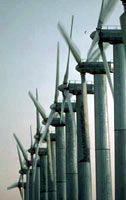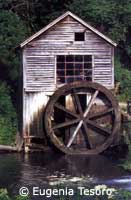
News |
- Iceland Abandons Part of Whaling Program
- Canada Dragging its Feet on Pollution Control?
- Manitoba Receives 'D-'Species At Risk Report
- Wind Energy 2004 Election Issue
- Rolling Stone Rocks With Climate Change Article
- Energy Manitoba Web Site Expands!
- Supreme Court Favours Monsanto
- New Lake Winnipeg Web Site
- Boreal Forest Generates Flood of Faxes
- The Climate Group Launched
- Manitoba Hydro Sends Mixed Messages
- Campaign Targets Boreal Forest Pulp and Paper
Iceland Abandons Part of Whaling Program |
10 June 04 |
 Environmental group Greenpeace claimed a victory on June 2, 2004 when the Icelandic government announced that it will put their "scientific" whaling program on hold and limit this year's 'take' to 25 minke whales. The planned take of 500 whales, including sei and fin during a 2-year period. This announcement comes in the wake of strong domestic criticism of the whale hunt, combined with a diminished market for whale products. Despite global protests, Iceland resumed whaling last year for the first time in fourteen years.
Environmental group Greenpeace claimed a victory on June 2, 2004 when the Icelandic government announced that it will put their "scientific" whaling program on hold and limit this year's 'take' to 25 minke whales. The planned take of 500 whales, including sei and fin during a 2-year period. This announcement comes in the wake of strong domestic criticism of the whale hunt, combined with a diminished market for whale products. Despite global protests, Iceland resumed whaling last year for the first time in fourteen years.View the Greenpeace news release Source: Greenpeace
|
|
Canada Dragging its Feet on Pollution Control? |
10 June 04 |
 NAFTA's environmental agency - the North American Commission for Environmental Cooperation - says that Canada is moving more slowly than the United States in curbing pollution. The agency released a report called 'Taking Stock 2001 - North American Pollutant Releases and Transfers' on June 2, 2004 - Canada's annual Clean Air Day. The report shows that while total North American emissions declined by 18 per cent in the previous three years, Canada's emissions rose by three per cent between 1998 and 2002.
NAFTA's environmental agency - the North American Commission for Environmental Cooperation - says that Canada is moving more slowly than the United States in curbing pollution. The agency released a report called 'Taking Stock 2001 - North American Pollutant Releases and Transfers' on June 2, 2004 - Canada's annual Clean Air Day. The report shows that while total North American emissions declined by 18 per cent in the previous three years, Canada's emissions rose by three per cent between 1998 and 2002.Taking Stock 2001 is the eighth report of the series to compare industrial pollution sources in North America. The report is intended to help identify opportunities for pollution reduction, and is based upon the pollution inventories of the United States and Canada. Ontario was found to be the third-biggest polluting province or state on the continent after North Carolina and Ohio, with the Nanticoke generating station on the shore of Lake Erie responsible for eight per cent of Canada's total emissions. The coal plant has installed pollution controls since the study was done. In 2001, Canadian industrial plants released almost 2.7 million kilograms of hazardous chemicals. The electricity sector was the biggest source of toxic pollution in North America, due mainly to the use of coal at generating plants. View the North American Commission for Environmental Cooperation press release View the 'Taking Stock 2001' report View the 'Taking Stock 2001' web site Source: North American Commission for Environmental Cooperation, CBC news online
|
|
"The federal government currently spends more on wildlife recovery efforts then all the provinces combined. No province is adequately investing in the protection of species at risk, but it is unconscionable that B.C., Alberta and Saskatchewan have actually decreased funding over the past year," said Marc Johnson, Manager of Protection Campaigns for the Canadian Nature Federation and a spokesperson for the Nature Network.
Manitoba received a D- for its efforts to protect and recover species at risk over the past year.
View the full Canadian Nature Network report card for all provinces
Visit the Canadian Nature Federation web site
View the Canadian Nature Network press release
Source: Canadian Nature Federation


 RSS Feeds:
RSS Feeds: Canada's naturalist community released its annual report card for the protection of species at risk in Canada on June 3, 2004. The Canadian Nature Network prepared the 2004 Species at Risk Report Card to answer the question: How well did Canada's governments perform in protecting and recovering species at risk over the past year? The Report Card reviews the performance of federal, provincial and territorial governments using eight standard indicators.
Canada's naturalist community released its annual report card for the protection of species at risk in Canada on June 3, 2004. The Canadian Nature Network prepared the 2004 Species at Risk Report Card to answer the question: How well did Canada's governments perform in protecting and recovering species at risk over the past year? The Report Card reviews the performance of federal, provincial and territorial governments using eight standard indicators. In sharp contrast to the 2000 federal election in Canada, wind energy has now 'blown' on to the national political stage. With the release of the Liberal election platform on June 3, 2004, five national political parties (Liberal, NDP, Conservative, Bloc Quebecois, Green) are committed to supporting an aggressive expansion of wind energy / renewable energy in Canada.
In sharp contrast to the 2000 federal election in Canada, wind energy has now 'blown' on to the national political stage. With the release of the Liberal election platform on June 3, 2004, five national political parties (Liberal, NDP, Conservative, Bloc Quebecois, Green) are committed to supporting an aggressive expansion of wind energy / renewable energy in Canada.  Climate Change has arrived as an issue worthy of attention in pop culture circles - it has been featured in an article in Rolling Stone magazine, known for being at the cutting edge of popular culture. In a May 19, 2004 article, Tim Dickinson writes about climate change as an issue requiring serious consideration by everyone living on this planet. He references the Intergovernmental Panel on Climate Change and the recent US Defense Department 'doom and gloom' report on the subject, among others, using examples such as last summers killing heat wave in France and melting polar icecaps to illustrate the issue. The policies and actions of US President George Bush are harshly criticized as ignoring the obvious changes that have already illustrated the effects of human contributions to greenhouse gas emissions and climate change.
Climate Change has arrived as an issue worthy of attention in pop culture circles - it has been featured in an article in Rolling Stone magazine, known for being at the cutting edge of popular culture. In a May 19, 2004 article, Tim Dickinson writes about climate change as an issue requiring serious consideration by everyone living on this planet. He references the Intergovernmental Panel on Climate Change and the recent US Defense Department 'doom and gloom' report on the subject, among others, using examples such as last summers killing heat wave in France and melting polar icecaps to illustrate the issue. The policies and actions of US President George Bush are harshly criticized as ignoring the obvious changes that have already illustrated the effects of human contributions to greenhouse gas emissions and climate change. EnergyManitoba.org) is expanding! Near the end of the Clean Environment Commission (CEC) hearings for the proposed Wuskwatim Generation and Transmission projects approaches, we are adding several new items to our main menu. This is in addition to existing information such as news stories about the proposed hydro projects, daily summaries of the CEC hearings, and electronic versions of presentations made in the hearings. Additions will be posted throughout June. New features on the site include:
EnergyManitoba.org) is expanding! Near the end of the Clean Environment Commission (CEC) hearings for the proposed Wuskwatim Generation and Transmission projects approaches, we are adding several new items to our main menu. This is in addition to existing information such as news stories about the proposed hydro projects, daily summaries of the CEC hearings, and electronic versions of presentations made in the hearings. Additions will be posted throughout June. New features on the site include:
 The battle of Saskatchewan, Canada farmer Percy Schmeiser against corporate agricultural and biotech giant Monsanto ended May 21, 2004. The Supreme Court of Canada ruled in a narrow 5-4 decision that Mr. Schmeiser had infringed Monsanto's patent by growing a special kind of canola without a license. Monsanto has a patent for a gene that confers resistance to the company's Roundup herbicide.
The battle of Saskatchewan, Canada farmer Percy Schmeiser against corporate agricultural and biotech giant Monsanto ended May 21, 2004. The Supreme Court of Canada ruled in a narrow 5-4 decision that Mr. Schmeiser had infringed Monsanto's patent by growing a special kind of canola without a license. Monsanto has a patent for a gene that confers resistance to the company's Roundup herbicide.  Manitoba Water Stewardship Minister Steve Ashton announced a new web site May 20, 2004 that will provide Manitobans with information on Lake Winnipeg.
Manitoba Water Stewardship Minister Steve Ashton announced a new web site May 20, 2004 that will provide Manitobans with information on Lake Winnipeg. Support for the protection of Manitoba's Boreal forests has motivated tens of thousands of people to voice their concerns and send faxes to Manitoba Hydro and the Government of Manitoba. The action is part of the campaign by US-based Natural Resources Defense Council (NRDC) to raise awareness about threats to the ecological integrity of the Boreal forest and generate pressure for action. Manitoba's Boreal forests are a major source of forest products for US markets and consumers.
Support for the protection of Manitoba's Boreal forests has motivated tens of thousands of people to voice their concerns and send faxes to Manitoba Hydro and the Government of Manitoba. The action is part of the campaign by US-based Natural Resources Defense Council (NRDC) to raise awareness about threats to the ecological integrity of the Boreal forest and generate pressure for action. Manitoba's Boreal forests are a major source of forest products for US markets and consumers. The Climate Group, a new coalition of the world's leading reducers of greenhouse gas emissions, was officially launched on 27 April by British Prime Minister Tony Blair. The Climate Group was established to promote the reduction of greenhouse gas (GHG) emissions globally, and bring together GHG 'reducers', a diverse group of governmental and corporate actors from differing jurisdictions and sectors committed to reducing GHG emissions.
The Climate Group, a new coalition of the world's leading reducers of greenhouse gas emissions, was officially launched on 27 April by British Prime Minister Tony Blair. The Climate Group was established to promote the reduction of greenhouse gas (GHG) emissions globally, and bring together GHG 'reducers', a diverse group of governmental and corporate actors from differing jurisdictions and sectors committed to reducing GHG emissions. While the Clean Environment Commission (CEC) review and hearings for the proposed Wuskwatim projects continue, Manitoba Hydro's credibility and integrity is being called into question following conflicting testimony by Mr. Ken Adams, Manitoba Hydro Vice-President of Power Supply.
While the Clean Environment Commission (CEC) review and hearings for the proposed Wuskwatim projects continue, Manitoba Hydro's credibility and integrity is being called into question following conflicting testimony by Mr. Ken Adams, Manitoba Hydro Vice-President of Power Supply. Environmental groups ForestEthics, Greenpeace Canada, Natural Resources Defense Council and Rainforest Action Network launched an international campaign to harness the purchasing power of U.S. paper consumers in a bid to force major forest companies to change their logging practices in Canada. The groups called on 500 corporations to halt purchases of lumber and pulp that contribute to the destruction of the largest remaining ancient forest in North America.
Environmental groups ForestEthics, Greenpeace Canada, Natural Resources Defense Council and Rainforest Action Network launched an international campaign to harness the purchasing power of U.S. paper consumers in a bid to force major forest companies to change their logging practices in Canada. The groups called on 500 corporations to halt purchases of lumber and pulp that contribute to the destruction of the largest remaining ancient forest in North America.